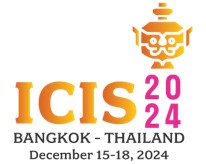| 2024 | ||
| Sunday, December 15th | ||
|---|---|---|
|
Mariam Bellger, TU Dresden
|
||
| 12:00 AM |
Beyond Code: The Impact of Generative AI on Work Systems in Software Engineering Olivia Bruhin, University of St.Gallen
|
|
| 12:00 AM |
Effect of Artificial General Intelligence on Organizational Learning Yonggang Li, National University of Singapore
|
|
| 12:00 AM |
Enacting Accountability in Decentralized Organizations: A Study of the Optimism Collective DAO Nina Schirrmacher, Vrije Universiteit
|
|
| 12:00 AM |
Examining entangled power and performativity in robot-related work Anna Lampi, University of Jyväskylä
|
|
| 12:00 AM |
Kristin Geffers, University of Kassel
|
|
| 12:00 AM |
Flows and Flaws of Expertise in Microtasking Platforms: The Case of Amazon MTurk Reza Baygi, Vrije Universiteit Amsterdam
|
|
| 12:00 AM |
Ekaterina Jussupow, Technical University of Darmstadt
|
|
| 12:00 AM |
Mario Sosa-Hidalgo, Vrije Universiteit Amsterdam
|
|
| 12:00 AM |
From generation to application: Exploring knowledge workers’ relations with GenAI Rasmus Ulfsnes, NTNU
|
|
| 12:00 AM |
From Gutenberg to GPT: How Journalists Make Sense of Generative AI through Occupational History Julian Prester, University of Sydney
|
|
| 12:00 AM |
Generative Assistants for Handling Incidents in IT Service Management Rainer Schmidt, Munich University of Applied Sciences
|
|
| 12:00 AM |
How Intelligent Technologies Influence the Role of Knowledge Workers in the Tech Industry Min Ou, Baylor University
|
|
| 12:00 AM |
HR Analytics Adoption by Public Personnel: The Mediating Role of Data Analytics Skills Guido Ongena, University of Applied Sciences Utrecht
|
|
| 12:00 AM |
Integrating Generative AI into Work: A Case Study of Changes to Core Job Characteristics Etienne Thenoz, Université de Nantes
|
|
| 12:00 AM |
Neurodiversity, Emotional Labor, and Mental Wellbeing in IT Employees Ronnie Jia, University of North Texas
|
|
| 12:00 AM |
Miriam Möllers, University of Münster
|
|
| 12:00 AM |
Social Media Feedback Dynamics: The Influence of Community and Technology on Content Creators Tatjana Hödl, University of Bern
|
|
| 12:00 AM |
Lauren Waardenburg, ESSEC Business School
|
|
| 12:00 AM |
The Role of the Metaverse in Facilitating Innovation Processes within Distributed Work Settings Rosemary Francisco, UNISINOS University
|
|
| 12:00 AM |
Felix Hirsch, Dresden University of Technology
|
|
| 12:00 AM |
Jan Kraemer, University of Passau
|
|
| 12:00 AM |
“Us vs. Them” – A Qualitative Study on Group-Formation in Hybrid Meetings Florian Jürgen Meier, Friedrich-Alexander-Universität Erlangen-Nürnberg
|
|
| 12:00 AM |
Visibility Artifacts in Hybrid Work Bayu Nuswantoro, Victoria University of Wellington
|
|
| 12:00 AM |
Leah Lennig, Chair of Marketing and Innovation Management
|
|
Track Chairs
Michael Dinger, Ph.D., Baylor University
Damien Joseph, Ph.D., Nanyang Technological University Singapore
Manuel Wiesche, Ph.D., Dortmund University


